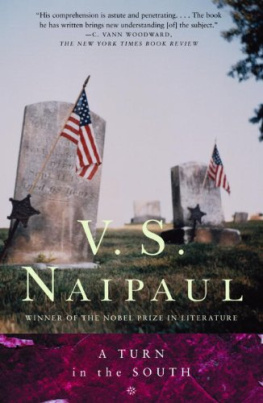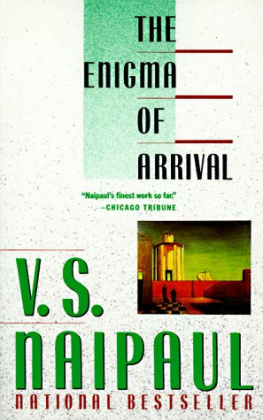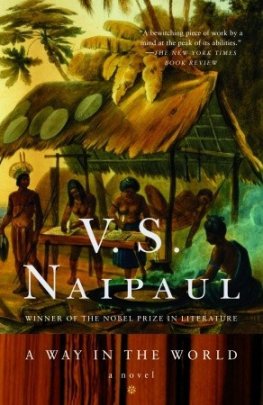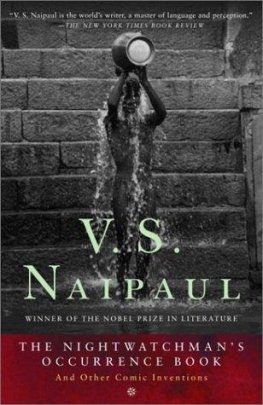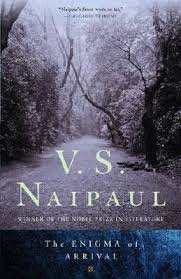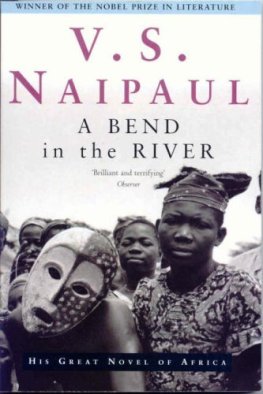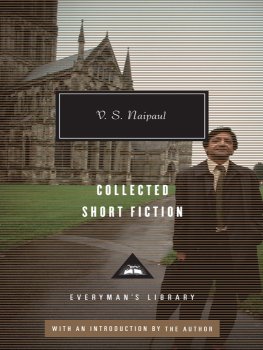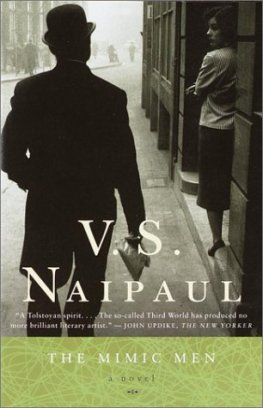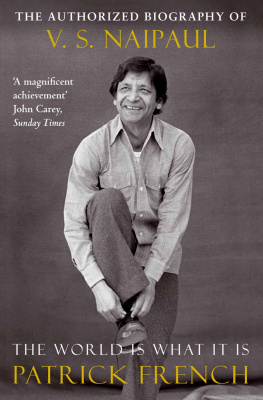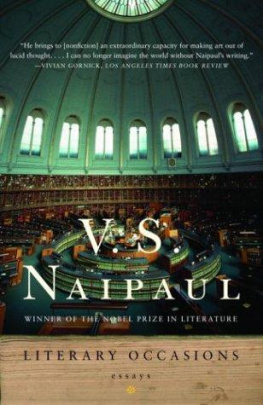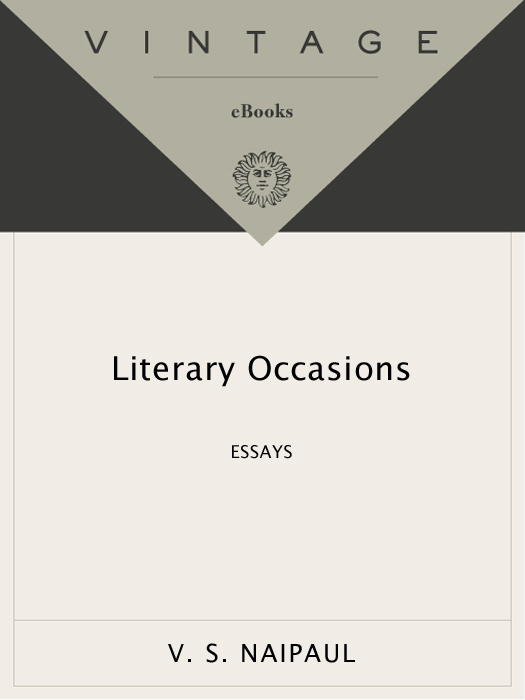ACCLAIM FOR V. S. NAIPAULS
Literary Occasions
Fascinating . Poignant . He shows an almost scientific precocity at being an observer and historian of his familys life . A lean little guidebook to the making of a Nobel laureate.
The Miami Herald
[Literary Occasions] shed[s] light on Naipauls intellectual evolution and on the source of his social insight, his humor, and his gentle melancholy.
The Boston Globe
Splendid . Affecting . The perfect complement to Naipauls volume of travel and political essays, The Writer and the World.
The Oregonian
[A] gift to the reading and writing public . Literary Occasions is an ideal place to make ones first acquaintance with Naipauls literary universe.
Fort Worth Star-Telegram
Deeply affecting . Personally revealing . Thoughtful clarity characterizes all his prose.
Richmond Times-Dispatch
Fascinating . Naipaul truly is a writer for the world.
The Tennessean
Nuanced, personal . Naipauls prose is a perfect combination of lucidity, elegance and gloom.
The Telegraph (Calcutta, India)
Naipauls essays play an important part in understanding this remarkable writer . Those already familiar with his work will find their understanding greatly enhanced by these essays.
The Star-Ledger (Newark, NJ)
Superbly written . [Naipaul is] a gifted and articulate writer whose prose, comments, and analysis force readers to closely inspect their own ideas.
Nashville City Paper
V. S. NAIPAUL
Literary Occasions
V. S. Naipaul was born in Trinidad in 1932. He went to England on a scholarship in 1950. After four years at Oxford he began to write, and since then he has followed no other profession. He is the author of more than twenty-five books of fiction and nonfiction and the recipient of numerous honors, including the Nobel Prize in 2001, the Booker Prize in 1971, and a knighthood for services to literature in 1990. He lives in Wiltshire, England.
ALSO BY V. S. NAIPAUL
NONFICTION
The Writer and the World: Essays
Between Father and Son: Family Letters
Beyond Belief: Islamic Excursions Among the Converted Peoples
India: A Million Mutinies Now
A Turn in the South
Finding the Center
Among the Believers
The Return of Eva Pern (with The Killings in Trinidad)
India: A Wounded Civilization
The Overcrowded Barracoon
The Loss of El Dorado
An Area of Darkness
The Middle Passage
FICTION
Half a Life
A Way in the World
The Enigma of Arrival
A Bend in the River
Guerrillas
In a Free State
A Flag on the Island
The Mimic Men
Mr. Stone and the Knights Companion
A House for Mr. Biswas
The Suffrage of Elvira
Miguel Street
The Mystic Masseur
Published in an omnibus edition entitled The Nightwatchmans Occurrence Book
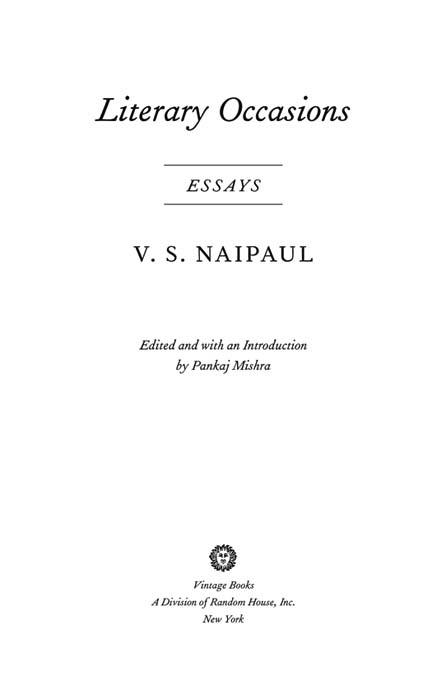
Introduction
IN 1836 , a few months before Pushkin died in a duel, the Russian review journal Telescope published the first letter in the collection that came to be known as Philosophical Letters by the Russian aristocrat and former army officer Pyotr Chaadaev. For some years, the letters, written originally in French, had been circulating secretly among the Westernised Russians in Moscow and St. Petersburgamong the rootless elite that Peter the Great had created in his attempt to make Russia more like Western Europe. But the publication of the first letter in Russian was, in the words of Alexander Herzen, who read it ecstatically while in exile, like a shot going off in the dark night. It was, later readers would say, the beginning of intellectual life in Russia.
Chaadaev denounced the cultural isolation and mediocrity of Russia; he denounced, too, the intellectual impotence of the Russian elite, of which he was himself a member. Our memories he wrote,
reach back no further than yesterday; we are, as it were, strangers to ourselves That is but a natural consequence of a culture that consists entirely of imports and imitation We absorb all our ideas ready-made, and therefore the indelible trace left in the mind by a progressive movement of ideas, which gives it strength, does not shape our intellect We are like children who have not been taught to think for themselves: when they become adults, they have nothing of their ownall their knowledge is on the surface of their being, their soul is not within them.
With these lines, Chaadaev made public some intense growing self-doubts among privileged Russians who looked up, out of long-established habit, to Western Europe for cultural direction but felt painfully alienated from the vast wretched majority of the Russian people. In a poem written as early as 1824, Pushkin had made his protagonist wonder if the truth is somewhere outside him, perhaps in some other land, in Europe, for instance, with her stable historical order and well-established social and civic life. For much of the nineteenth century, Turgenev, Tolstoy and Dostoyevsky were to define in diverse and fruitful ways their own ambivalent relationship with the West as well as with their semi-derelict society.
ONE OF Pushkins disciples, Gogol, turned out to be one of the most influential figures in this great intellectual and spiritual awakening of Russia. He published his first stories in 183132, four years before the publication of Chaadaevs letter. It was to these brisk comic sketches about life in the Ukraine that V. S. Naipaul once compared the stories about the peasant Indian world of Trinidad written by his father, Seepersad. Naipaul saw and heard these stories come into being during the first eighteen years of his life, which he spent in Trinidad; then, for three years, from 1950 until his father died, he followed their progress from England. They gave Naipaul not only his literary ambition but alsoat a time of poverty and despair in England, when Naipaul began to write and didnt know how to go onits crucial basis.
The stories drew upon Seepersads experience as a journalist and government official in the Trinidad countryside, where his own family along with other descendants of Indian indentured labourers had re-created a miniature village India. They dealt partly in romance, in that they presented the Hindu world of the peasants as idyllically whole, in which ancient ritual and myth explained and fulfilled all human desires. Although Seepersad based his characters on members of his own extended family, he did not write about their dereliction and pain, and the humiliation he had himself suffered as a young waif. But then, as Naipaul wrote in his foreword to an edition of Seepersads stories published in 1976, certain things can never become material. My father never in his life reached that point of rest from which he could look back at his past.
For Naipaul, the comparison with Gogol ended here. Seepersad found his voice as a writer in the last hard years of life in Port of Spain; Gogol found it at the beginning of his career. Seepersad made the long journey away from his peasant origins, discovered a literary vocation through journalism, only to find that he had little to write about; Gogol overcame in his early stories what Chaadaev saw as a shameful intellectual and literary inertia, and then had, as material, Russia to fall back on and claim.


